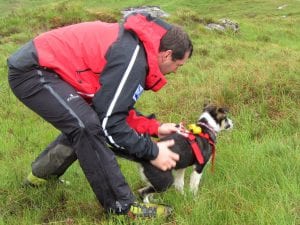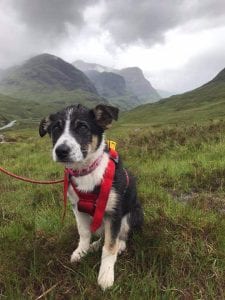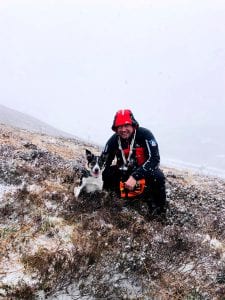Q & A with a SARDA Search Dog Handler

Q & A with a SARDA Search Dog Handler
Introducing Stu MacIntyre, SARDA Scotland Team member and his dog Pippa

What is your role in Mountain Rescue?
I am a dog handler with SARDA Scotland as well as their equipment officer. As the equipment officer, in addition to the operational kit, I look after all the weekend training kit that is really important to our bodies who spend hours lying on hills sides in all weathers. I was previously a member of the RAF Mountain Rescue Service from 1998 until 2015 and was the deputy team leader for RAF Kinloss MRT from 2005 until 2008.
Can you tell me a bit more about your search dog Pippa?
Pippa is my second search dog, we got her two and a half years ago as a pup when I knew that my search dog at the time (Nell) would be coming up to retirement. She came from a farm near Forres and is a Collie/Australian Kelpie cross from great working stock. I planned all along when we got her that I would train her as a search dog.

What makes a good search dog?
This is a question that I get asked a lot, there are many thoughts but here are mine. A good search dog should be a medium to large build (good stamina), but not too large (it’s tiring carrying a very large dog over fences!). A good play drive is also important as toy’s feature very heavily in the training and a high play drive helps hugely (although isn’t a deal breaker). Hair length is also consideration, long hair can cause issues in winter with balling up around feet and their underside, this can be helped with oils to stop the snow sticking.
In short most working dogs can be trained as search dogs as they possess most if not all of the above attributes. The most common search dogs tend to be Border Collies, Labradors, German Shepherd’s and Spaniels but there are other breeds too, such as Belgian Shepherd’s, Labrador/Pointer cross and Spaniel/Collie Cross.
What do you think is the one thing that people are least likely to know about search dogs?
Members of the public are often surprised to learn that the dogs are the family pet too.
What’s involved for both you and Pippa in training her as a search dog?
Each search dog association trains their dogs (and handlers) in slightly different ways, but in general the stages are all the same. So me and Pippa went through the same stages as other dogs and handlers, this took about 2 years in total (but can be longer depending on the breed and circumstances).
The first part is puppy school, during this period Pippa (and me) get to see the body run away with the toy and hide only a short distance away. Pippa is then sent off to ‘find’ and barks at the body to get the toy. This stage is all about linking play to the find. Puppy school then stretches the distance and leads to very small blind searches, getting the dogs to scent the body rather than visually find them.
On graduation from puppy school, we moved onto covering larger and larger search areas, with up to 2 bodies hidden in them. During this stage of training the teamwork starts to come to play and the handler needs to work the dog in the search area to be as efficient as possible depending on the wind conditions and ground.
Before the assessment weekend we had 2 more tests to do. First we had an obedience test to ensure Pippa could be kept under control whilst of the lead. Secondly, we had a Stock test, during this Pippa and me were placed in a pen with sheep under the watchful eye of the shepherdess, this test is to ensure that Pippa can be trusted and controlled when in close contact with sheep, thankfully we passed both.
We then had to pass an assessment weekend. This is normally a three day weekend (although due to Covid it was reduced to two days for us) with external assessors from other Search Dog Associations to witness the process and provide independent verification of our standards.
On passing this initial assessment we were awarded Novice Dog Status and were placed on the callout list.
The next year is similar to the last part of the first; covering large blind search areas to further bond and become an even more efficient team. This led to a Full Dog assessment which in our case was conducted during normal training weekends (due to Covid).
What do you enjoy most about training a search dog and being in a SARDA team?
The most rewarding part of training a Search Dog is seeing them work a scent over a large area. At that point of the search, the dog is almost on a kind of auto pilot and once in the scent cone it will work so hard to stay in the scent to get to the body.
The SARDA Team is fantastic because we all come from different walks of life but have the one thing in common that we love dogs and training them to save lives.
What is the hardest and most challenging thing?
Learning to trust your dog and not doubt their ability, is tricky. But I think the hardest thing is remembering that you are a team, you cannot rely solely on the dog, they can only find the scent if you get them to it. They rely on you as the handler to have a search strategy for each area, without a strategy the dog will have to work so much harder and you the handler have let them down.
What’s next for you and Pippa?
From been graded as “Full Search” we will continue to train and attend the monthly SARDA training, with a “Re-grading” due in 6 years’ time. But with winter on the way, we will concentrate on avalanche search skills and integrating into a full avalanche search party.
